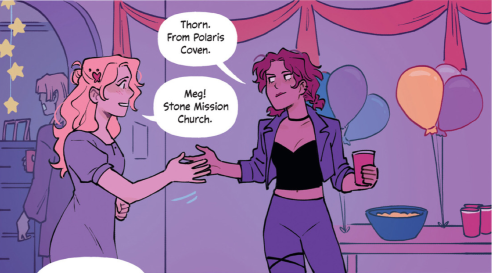Part of me is surprised that no one has ever asked me why I call myself a “witch” rather than something from Norse practice (like a spae-man or a seithman.1) Probably because I often ask myself that same question and project my own tendency to question my choices onto others. But the fact that someone — even if only myself — is asking, I thought i might be beneficial to explore the answer to the question in a blog post. So here I go.
I started calling myself a witch back in 1998 when I first started exploring non-initiatory Wicca. I dropped the label somewhat when I started exploring Druidry through Ár nDraíocht Féin and then Heatherny through The Troth. However, I eventually realized that neither of these organizations quite nourished my spirit or matched how I perceived my own religious or magical practice, so i decided to go back to calling myself a witch and adopted the term “Vanic witch” to signify just how central my relationship with Freyja was to my own practice of witchcraft.
At this time, I also got involved with an email list that focused on discussing initiatory witchcraft. I found the definition that one of the initiates offered for witchcraft resonated with me:
A witch is someone who serves the role of both priest who serves the gods and ecstatic practitioner who seeks direct experience of the mystical.
Rough paraphrase of a definition given by an elder of the Mohsian tradition.
That’s how I saw (and still see) my own practice so I decided “witch” was the right term for me after all.
Mind you, I do occasionally use other labels to describe myself. I do like “seithman” and “spae-man,”2 as these refer to particular aspects of my practice (or aspects I want to incorporate into it). But they don’t really seem to encompass the entirety of my practice.
To be honest, this is reinforced by the fact that I allow my practice to be syncretic as well. These syncretic practices don’t fit into many of the Norse-specific words. And to be honest, a lot of Heathens who are more strict reconstructionists seem to almost frown on those of us who, for example, still find Tarot to be a useful tool.3 For me, “witch” is a more generic term which makes space for all my practices. It is inclusive of all the tools in my magical practitioner’s toolbox. Both those that have a basis in Norse culture and those that may be syncretized with it.
Also, I think calling myself a “witch” means I’m using an easily recognizable term more people are familiar with. If I say I’m a seithman, a spae-man, or a vitki, most people are going to have no clue what I’m talking about. Heck, I typically have to explain why i call myself a wyrd-worker.4
But if I say I’m a witch, most people have a rough idea of what I’m talking about. And now that people are becoming more aware that there are other witchcraft traditions and practices beyond just Wicca, mistaken assumptions about me along those lines also seem to be less common.
Post History: I wrote the original draft of this post on July 21, 2024. I proofread, revised, and finalized it on July 22, 2024.
Footnotes
- Of course, those who know me closely or have followed me long enough might already know that I have “seithman” as one of my email account names. I won’t post the full email address here, as I don’t want to encourage the spammers who already like to hit me up through my contact list. ↩︎
- I personally find “spae-master” entirely too prideful to consider using, however. ↩︎
- I will note, however, that I am not a fan of trying to blend such syncretic practices to the point where I try to make some universal, coherent system out of all of it. I love both the runes and the Tarot and find them useful, but i see no reason to throw them into a blender and make a single symbol system out of them. In fact, I tend to think it disrespects both practices. ↩︎
- Here’s a bit of interesting trivia for you: I typically only refer to myself as a wyrd-worker on my blog and social media. In fact, I started doing it when I created my YouTube channel. I was trying to come up with a name for the channel, and considered “A Witch’s Wisdom.” However, I realized that there were so many witch influences out there and wanted something a bit more unique. So I came up with “A Wyrd-Worker’s Wisdom” instead. And while the term absolutely reflects my understanding of my witchcraft practice and its nature, I will be forever amused by the reality that I adopted the label for the purposes of branding. ↩︎



